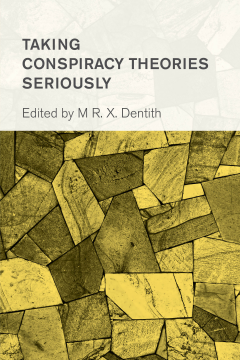
Additional Information
Book Details
Abstract
The contributors to this volume argue that whilst there is a commonplace superstition conspiracy theories are examples of bad beliefs (and that the kind of people who believe conspiracy theories are typically irrational), many conspiracy theories are rational to believe: the members of the Dewey Commission were right to say that the Moscow Trials of the 1930s were a sham; Woodward and Bernstein were correct to think that Nixon was complicit in the conspiracy to deny any wrongdoing in the Watergate Hotel break in; and if we either accept the terrorist events of 9/11 were committed by Al-Qaeda, or that the Bush Administration was responsible, then it seems we are endorsing some theory about a conspiracy to commit an act of terror on American soil. As such, there is no reason to reject conspiracy theories sui generis. This volume challenges the prima facie that conspiracy theories are irrational beliefs, arguing that we should treat conspiracy theories and the phenomena of conspiracy theories seriously. It presents fresh perspectives from the wider philosophical, sociological and psychological community on what is becoming an issue of increasing relevance in our time.
In our current age of conspiracy, it’s vitally important for everyone – academics, journalists, and engaged citizens – to study and try to understand conspiracy discourse. This provocative book gives us the tools we need to take conspiracy theory seriously.
Kathryn Olmsted, Professor of History, University of California, Davis
Matthew R. X. Dentith is the author of The Philosophy of Conspiracy Theories (2014). He is currently a Fellow in the Institute for Research in the Humanities (ICUB) at the University of Burcharest, where he is working on a research project called “The Ethics of Investigation: When are we obliged to take conspiracy theories seriously?”
Most discussions of conspiracy theory generate far more heat than light. It is a profound relief, then, to see this work published. M R. X. Dentith has here assembled a formidable cast of many of the major figures in philosophical debates about conspiracy theory. For those working in the area – as well as many outside it – this volume is essential reading.
Chris Fleming, Associate Professor of Philosophy, Western Sydney University
Focussing on the controversy generated by a 2016 Le Monde opinion piece on conspiracy theorising, as well as ongoing debate over the distinction between particularism and generalism about conspiracy theories, this collection, edited by M.R.X. Dentith, brings together the latest and best academic writing about conspiracy theorising. Required reading for anyone interested in the epistemology and ethics of conspiracy theories.
Steven Clarke, Faculty of Philosophy, University of Oxford
This volume represents an important contribution to the philosophical debate on conspiracy theories. Conspiracies are common, but they are usually revealed by investigative journalists, authorities and individual leakers, not by conspiracy theorists. However, this does not show that conspiracy theories should be dismissed just because they have been labeled as “conspiracy theories”. Rather, we must treat every conspiracy theory according to the evidence. One of the bravest books known to me on the topic.
Juha Räikkä, Professor of Philosophy, University of Turku
Matthew Dentith is one of the most important social epistemologists studying conspiracy theories. In this fascinating volume, he has assembled many of the top minds studying conspiracy theories to tackle the most important emerging questions regarding conspiracy theories and their study – the answers to which will both satisfy and agitate. This volume is an essential collection for anyone seeking to truly understand conspiracy theories and the people who believe them.
Joseph Uscinski, Associate Professor, Department of Political Science, University of Miami
Table of Contents
| Section Title | Page | Action | Price |
|---|---|---|---|
| Cover | Cover | ||
| Half Title | i | ||
| Series Information | ii | ||
| Title Page | iii | ||
| Copyright Page | iv | ||
| Contents | v | ||
| Acknowledgments | vii | ||
| SectionOne: The Particularist Turn in the Philosophy of Conspiracy Theories | 1 | ||
| 1 When Inferring to a Conspiracy Might Be the Best Explanation | 3 | ||
| 2 Conspiracy Theory and the Perils of Pure Particularism | 25 | ||
| 3 Conspiracy Theory Particularism, both Epistemic and Moral, Versus Generalism | 39 | ||
| 4 What Particularism about Conspiracy Theories Entails | 59 | ||
| SectionTwo: Diagnosing Conspiracy Theory Theorists | 71 | ||
| 5 The Conspiracy Theory Theorists and Their Attitude to Conspiracy Theory—Introduction to Section Two | 73 | ||
| 6 The Psychologists’ Conspiracy Panic: They Seek to Cure Everyone | 79 | ||
| 7 Social Scientists and Pathologizing Conspiracy Theorizing | 95 | ||
| 8 Governing with Feeling: Conspiracy Theories, Contempt, and Affective Governmentality | 109 | ||
| 9 Conspiracy Theorists and Social Scientists | 125 | ||
| 10 Clearing Up Some Conceptual Confusions about Conspiracy Theory Theorizing | 141 | ||
| 11 To Measure or Not to Measure? Psychometrics and Conspiracy Theories | 155 | ||
| 12 Anti-Rumor Campaigns and Conspiracy-Baiting as Propaganda | 171 | ||
| 13 On Some Moral Costs of Conspiracy Theory | 189 | ||
| 14 Conspiracy Theories, Deplorables, and Defectibility: A Reply to Patrick Stokes | 203 | ||
| 15 Taking Conspiracy Theories Seriously and Investigating Them | 217 | ||
| Bibliography | 227 | ||
| Index | 241 |
